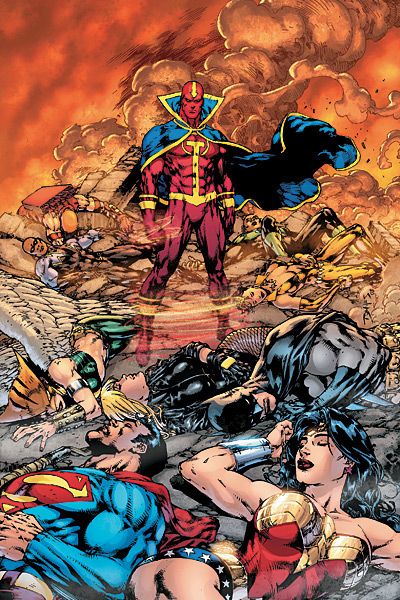One of the reasons Brad Meltzer's run on "Justice League of America" was so critically unsuccessful was that his tone would radically shift between superhero whimsy, mature sexuality, fannish enthusiasm, and explicit violence. It was that uncomfortable mix of the juvenile and the adult -- so explicit in the character's dialogue and the illustrations of Ed Benes -- that made the launch of this series so unsavory. For whatever reason, Dwayne McDuffie has now fallen into the Meltzer trap. "Justice League of America" #22 feels like more than just a sequel to Meltzer's Red Tornado fetish; it feels like a slice of Meltzer from a year ago, stuck in a draw for fermentation, and released past its sell-by date.
Part of the problem is Benes' art itself. Superhero comics have traditionally been hyper-sexualized, at least in the portrayal of the human form, but Benes pushes the tradition towards overt sleaze. McDuffie's script may be full of exaggerated superhero melodrama, but it's difficult to appreciate even his ham-handed attempts at subtlety when, on page eight, Vixen's pathos is overwhelmed by her immense cleavage. Immense cleavage isn't the right term for it -- it's more like strip club exhibitionism. It's a ridiculous page of artwork, especially considering that the explicit image corresponds to a panel in which Vixen is supposed to be shaken up about her past behavior. It's as if Benes has no interest in telling the same story as McDuffie. He just seems to want to draw the most ridiculous, "sexy" poses. The Jenna Jameson comic is more nuanced and discreet.
This whole issue is a mess, though. Benes is largely to blame for the poor storytelling choices, but McDuffie doesn't get off the hook that easily. He's responsible for the dialogue and structure of this issue, which, like the artwork, is wildly sexed up. (But what's weird about this issue is that Benes emphasizes the sexuality at the wrong times. It's like he's reading a completely different script than the one provided in the dialogue.)
Here's a snippet of dialogue between Red Tornado and his girlfriend: "I love you. I make love with you," says the girlfriend. "I'm not just talking about sex. I'm talking about my need to belong," replies Reddy. Talk about "on-the-nose" dialogue! And that's the thing about this issue. It pretends to explore mature relationships between these costumed superheroes and their loved ones, but it's all so simplistic and trite. It's a middle school mentality where the discussion of sex evokes a cheap thrill but there's no substance to the discussion because there's no sophisticated understanding behind it.
And for all the scene-shifts between various PG-13 romantic dramas, this issue is just another story of the android Amazo getting a new robot body. McDuffie and Benes are just retelling the same old story -- the same story that began this new series less than two years ago: Red Tornado is sad, and Amazo can beat people up. It's almost as if someone at DC said, "hey, remember how well those first few Justice League issues sold, back in 2006? Let's do that story again, we'll sex it up even more, and we'll sell millions of copies this time!" I'm not cynical enough to believe that was the real thinking behind this issue, but it sure feels that way, and that's just as bad.

